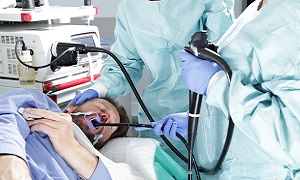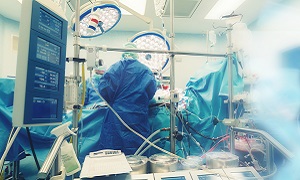Best Oncologists for Stomach Cancer Treatment in India
Best Stomach Cancer Treatment Hospitals in India
Hospital Highlights:
- Apollo Hospitals is a private healthcare group in India, with its headquarters based in Chennai. Established in 1983 by Dr. Prathap C. Reddy, the group offers a wide range of medical treatments and services across various specialties.
- It is renowned for emphasizing innovation and utilizing cutting-edge medical technologies into patient treatment.
- Known as India’s first corporate hospital, Apollo Hospitals is often credited for pioneering the private healthcare revolution in the country.
- With clinics and hospitals located all throughout India, Apollo Hospitals is a nationwide healthcare organization. Its presence can also be found in foreign countries.
- Preventive health examinations, medical and surgical treatment, and diagnostic centres are just a few of the services that the Apollo group provides.
- The group has several centres of expertise, including Cardiac Sciences, Neurosciences, Orthopedics, Emergency Care, Cancer Care, and Organ Transplantation.
- City: Chennai, India
Hospital Highlights:
- RIMC is a multi-specialty hospital in a sprawling area of 36 acres located in Chromepet, Chennai, Tamil Nadu, India.
- The facility has 450 beds including 130 critical care beds, 9 operating rooms, modern reference laboratories and radiology services, and is conveniently located near road, rail and air transportation.
- RIMC is led and managed by world-renowned physicians committed to healthcare.
- RIMC offers the broadest range of clinical care, education, and research. The hospital offers state-of-the-art technology and modern treatment facilities designed to provide health care at an affordable cost.
- Rela Institute is driven by patient needs, comfort and confidence.
- City: New Delhi, India
Hospital Highlights:
- Fortis Hospital in Shalimar Bagh is a multi-super specialty hospital that strives to provide world-class patient care by leaving no stone unturned.
- Fortis, Shalimar Bagh, with 262 beds and a 7.34-acre footprint, provides the best level of medical care through its team of doctors, nurses, technicians, and management professionals.
- City: Bengaluru, India
Hospital Highlights:
- Established in 2007, the Apollo Hospitals Bangalore is a 300-bed multispecialty hospital situated in Bannerghatta Road, Bangalore.
- Equipped with the state-of-the-art technology, it is a leading hospital dedicated to providing healthcare needs to patients with compassion and expertise.
- It is the first hospital to have completed the highest number of Robot Assisted Heart Surgeries in India.
- Over the years, it has successfully conducted some of the rarest medical procedures such as spinal angiolipoma excision, autologous chondrocyte implantations, and tibial tuberosity shift with MPSL reconstruction.
- The Apollo Hospitals Bangalore has the reputation of performing the greatest series of airway stents in the country.
- Additionally, the hospital is known for providing comprehensive treatment in specialties such as gastroenterology, urology, gynecology, oncology, colorectal surgery, etc.
- The “The Minimal Access Surgery Centre” (MASC), one of Apollo Hospitals, Bangalore’s premier Centres of Excellence, is devoted to the use of minimally invasive surgical procedures.
- In 2013, THE WEEK-A C Nielsen, Best Hospital Survey ranked Apollo Hospitals Bangalore as the 2nd best multi-speciality hospital in Bangalore.
- City: Mumbai, India
Hospital Highlights:
- Gleneagles Global Hospital The 450-bed facility comprises of 17-stories, housing state-of-the-art infrastructure, and advanced medical care facilities.
- The hospital offers end-to-end clinical, surgical, and diagnostic services. It is equipped with a team of eminent medical professionals aided by qualified nurses and medical staff
- The Hospital offers advanced Endoscopic procedures, Hepatobiliary and Liver Surgeries, Surgical and Medical Gastroenterology, Bariatric Surgery, and Robotic surgery.
- The hospital is a center of excellence for Orthopedics, Joint Replacement, Knee Replacement, and Hip Replacement surgery.
- City: Hyderabad, India
Hospital Highlights:
- CARE Hospitals were established in the year 2000, by CARE Group.
- The multispecialty hospital has 435 beds, including 120 critical care beds, with an annual inflow of 180000 outpatients and 16,000 in-patients.
- The hospital provides specialty medical services in Cardiology, Cardiothoracic Surgery, Pediatric Cardiology, Pediatric Cardiothoracic Surgery, Neurology, Neurosurgery, Nephrology, and Urology.
- The hospital has the first dual source, 128 slice CT scanner (for high precision cardiac imaging) – the first of its kind in south India.
- The hospital offers a wide range of accommodation facilities for the convenience of its varied patient base, ranging from general wards to super deluxe rooms.
- City: Mumbai, India
Hospital Highlights:
- Fortis Hospital in Mulund is a 315-bed multi-speciality tertiary care hospital with five JCI accreditations that offers a wide variety of diagnostic and treatment services. The Fortis Hospital in Mulund delivers patient-centred treatment with cutting-edge technology, highly skilled and experienced surgeons, and paramedical staff.
- This institution houses Maharashtra’s largest multi-organ transplant centre. It is also the first heart transplant centre in western India to conduct 100 or more consecutive heart transplants in under four years. It is the only hospital in the city to have multi-organ transplants and has handled the youngest patient for angioplasty. Fortis Hospital Mulund now boasts the first advanced surgical robot in central Mumbai.
- Cardiology and heart surgery, urology, nephrology, neurosciences, orthopaedics, digestive care, emergency and critical care, and maternity care are among the services provided by the hospital.
- City: New Delhi, India
Hospital Highlights:
- Manipal Hospitals, Dwarka, is a super-specialty hospital in Dwarka, New Delhi, which is a part of Manipal Hospitals Group.
- The hospital aims to provide the best treatment on par with international standards at a fraction of the cost.
- Equipped with 380 beds, the hospital is also one of the new age hospitals which are equipped fully with state-of-the-art infrastructure, cutting-edge technology as well as the latest and advanced clinical practices. The hospital also has 13 modular Operation theatres with 118 beds which are solely meant for critical care.
- The hospital comprises internationally acclaimed doctors and highly professional and experienced hospital and medical staff who are able to provide preventive, therapeutic, and diagnostic services all under one roof.
- City: Chennai, India
Hospital Highlights:
- Located in Chennai, India, MGM Healthcare is a top multispecialty hospital that provides all medical services under one roof.
- Since its founding in 2019, MGM Healthcare has quickly become a leading national referral centre, creating several innovative flagship initiatives.
- MGM Healthcare combines next-generation medical and digital technologies to provide better patient results.
- With 12 centres of excellence, more than 400 inpatient beds, 100 intensive care unit beds, and 24/7 emergency care, MGM Healthcare leaves no chance in redefining the patient experience in Chennai.
- MGM Healthcare boasts 250+ expert doctors across 30+ departments, including Cardiology, Pulmonology, Neurology, Obstetrics & Gynaecology, and more.
- They house 12 specialized Centres of Excellence, including Neurosciences, Orthopaedics, and Multi-Organ Transplantation.
- Their team of doctors, nurses, and paramedics works together to give every patient individualized treatment.
Hospital Highlights:
- Lilavati Hospital & Research Centre is India’s premier multi-speciality tertiary care hospital and has been recognised as a global medical excellence centre.
- Lilavati Hospital & Research Centre has built an unrivalled level of trust with its patients over the years, thanks to a solid foundation that comprises cutting-edge facilities, the best medical competence, research, education, and charity endeavours.
- The hospital is quite proud of the fact that it now serves patients from all kinds of backgrounds, not just from the United States but from all around the world.
- The hospital has a total of 323 beds, one of the largest Intensive Care Units (ICUs), 12 Operation Theatres with modern amenities, over 300 consultants, and almost 1,800 personnel.
Stomach Cancer
Stomach Cancer is the growth of cancerous cells within the lining of your stomach. There is a possibility that these calls might grow into a tumor. Also known as gastric cancer, this type of cancer grows slowly over several years, and is difficult to diagnose, as patients don’t show symptoms in the early stages.
Sometimes, it even goes undiagnosed until it spreads to other parts of the body, making it more difficult to treat.
Symptoms
There are generally various signs and symptoms of stomach cancer, and some of them include:
- Feeling bloated after a meal
- Difficulty swallowing
- Feeling full after eating small amounts of food
- Nausea
- Stomach pain
- Heartburn
- Vomiting
- Indigestion
- Unintentional weight loss
Causes & risk factors
Modern science is still researching what exactly makes cancer cells grow in the stomach. Few things are known to increase your risk for the disease. One of them is infection with bacteria which causes ulcers. Inflammation in your gut, which is known as gastritis can also increase the risk. Pernicious anemia, which is a type of long-lasting anemia, and certain growths in your stomach known as polyps are also known to make you more likely to get cancer.
Few other factors that might increase the risk of stomach cancer include:
- Smoking
- A diet high in smoked, pickled, or salty foods
- Being obese or overweight or obese
- Type- A blood
- Working in coal, timber, metal, or rubber industries
- Epstein-Barr virus infection
- Stomach surgery for an ulcer
- Exposure to asbestos
- Certain types of genes
Stages of Stomach Cancer:
Stage 1: Cancer is present in the inner lining of the stomach.
Stage 2: Cancer has spread into the deeper layers of stomach & nearby lymph nodes.
Stage 3: Cancer has spread to all the layers in the stomach as well as to the nearby organs like spleen or colon.
Stage 4: Cancer has spread far and wide to organs like the liver, lungs, or brain.
Diagnosis
There are several tests and procedures which are used in order to diagnose stomach cancer.
Upper endoscopy
Biopsy
Imaging tests
Your doctor will need to determine the stage of your stomach cancer before he/she can decide which treatment option is best for you. Tests and procedures which are used to determine the stage of cancer include:
Blood tests
Imaging tests
Imaging tests generally include positron emission tomography (PET) and CT scans.
Exploratory surgery
Your doctor may also need to perform surgery to check if cancer has spread beyond your stomach, within your chest, or your abdomen. Exploratory surgery is usually done laparoscopically. This means the surgeon will be making several small incisions in your abdomen and next insert a special camera that transmits images to a monitor in the operating room.
Depending on your situation, other staging tests might be used as well.
The information from these procedures might be used by your doctor to assign a stage to your cancer, which ranges from 0 to IV. The lowest stage indicates that the cancer is quite small and has affected only the stomach’s inner layers. However, by stage IV, the cancer is considered to be quite advanced and may have spread to other areas of the body.
Treatment
Surgery
The goal of surgery is removing all of cancer, as well as some of the healthy tissue around it.
Operations that are used for treating stomach cancer can include:
Removing early-stage tumors from the lining of the stomach
Subtotal gastrectomy
Total gastrectomy
Total gastrectomy involves the removal of the entire stomach as well as some surrounding tissue. After this, the esophagus is connected directly to your small intestine so that food is able to move through your digestive system. Total gastrectomy is generally meant for stomach cancers affecting the body of the stomach as well as those located in the gastroesophageal junction.
Removing lymph nodes to look for cancer
Surgery to relieve signs and symptoms
Radiation Therapy

Radiation therapy is a form of cancer treatment, that uses high-powered beams of energy, such as protons and X-rays to kill cancer cells. In this method, you lie on a table, over which a machine moves around you, sending the energy beams.
Sometimes, radiation therapy might be used before surgery as well, in order to shrink cancer, so that it can be removed more easily.
Radiation therapy is also used after surgery to kill any cancer cells that might be remaining. It is also often combined with chemotherapy.
Chemotherapy
Chemotherapy is a drug treatment that makes use of chemicals to kill cancer cells. The drugs travel throughout the body and kill the cancer cells that might have spread through the stomach.
This treatment might be given before surgery as well, to help shrink cancer so that it might be removed more easily. Chemotherapy is also used after surgery to kill any cancer cells that might be remaining in the body. Sometimes it might also be combined with radiation therapy.
In people with advanced stomach cancer, it might also be used in combination with targeted drug therapy.























